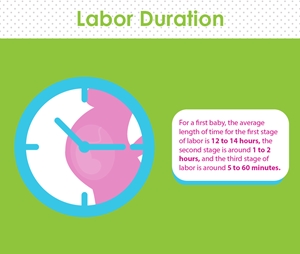
As delivery day draws near, you may find yourself with a persistent wish – that it will all go quickly. Wish as we might though, there's no scientific way to speed up the process of labor. Sadder news yet, studies have shown that first-time moms face longer laboring times than veterans of the maternity ward. If this is your first pregnancy, here's a realistic timeline of what you can expect come delivery day:
The basics
Sure, contractions may seem like torture, but they're a totally necessary piece in the birthing process. Contractions open and thin the cervix, making it possible for your baby to be born. Think about them this way and each contraction brings you one step closer to meeting your baby! So, bring them on, right?
When you hear stories of women laboring for days on end, you can rest assured they're not suffering through intense contractions from start to end. At its onset, labor can go entirely unnoticed by an expectant mom – and some women may even mistake mild contractions for cramps or an upset stomach.
Early and active labor
For a first-time mom, the first phase of labor – early and active labor – can last from 12 to 14 hours. Contractions will start mildly, and in the beginning, you'll be able to distract yourself through them. You may find that keeping busy around the house or going out for a gentle walk with friends is enough to take your mind off what's going on down there. You'll most likely be riding a wave of excitement and confidence before the real work begins.
Once your contractions are longer, stronger and closer together – and you can't talk through them – active labor has begun. At this point, the pain intensifies and you're most likely experiencing the type of contractions you often see on TV.
Birth
Once your cervix has thinned and dilated to 10 centimeters, your health care team will start cheering you on to push. By now, your baby has descended into the birth canal and you're ready to bring him or her into the world. Lucky for you, this grueling part of the process lasts an average 1 to 2 hours for first-time moms.
Afterbirth
Birthing a baby comes with not just one delivery, but two. After your little one has been born, you'll need to then deliver the placenta. This can be a simple process and last anywhere from 5 to 60 minutes for a first-time mom.
The bottom line
Historically, first-time moms spend longer in labor. Knowing what you'll be experiencing beforehand may offer peace of mind – and help you build up your confidence for the big day. So, what do you think? Is this the sort of news you were expecting? Share your thoughts on labor and delivery in the comments below.


Leave a Reply